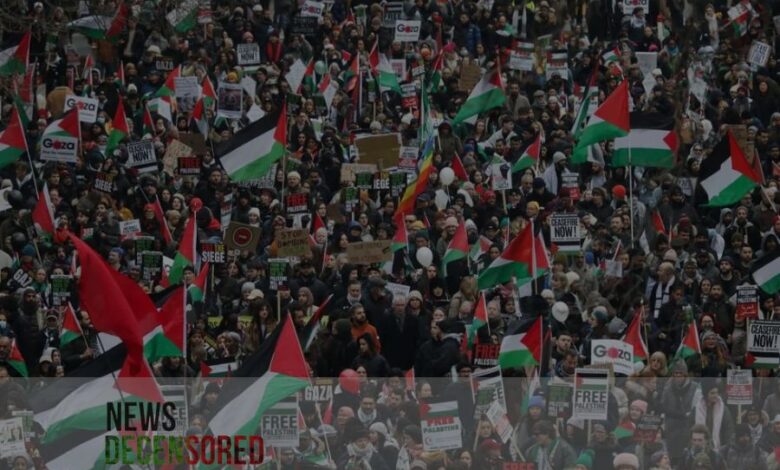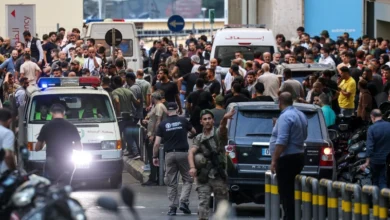Pro-Palestinian Protests in London Intensify as Thousands Demand Ceasefire in Gaza and Commemorate Nakba Anniversary

Tens of thousands of Palestinian supporters rally through Central London on Saturday, 15 May 2021, to protest against the current attack on Gaza and to commemorate the 76th Anniversary of Nakba. Nakba means ‘catastrophe’ in Arabic and denotes both the mass expulsion of more than 800,000 Palestinians from Israel in 1948 and the continuing repression of those Palestinians that remained in the new state as described by many historians as ethnic cleansing”.
Despite politicians taking no action over seven months of sustained nationwide protests, demonstrators are following up their demonstrations by calling politicians to action to end what they describe as genocide in Gaza. Other notable speakers included the legendary British singer Yusuf Islam, formerly Cat Stevens, who called on people to ‘support the Palestinian freedom and justice’.
Another personality, Palestinian photojournalist Motaz Azaiza, also addressed the gathering. Azaiza has been using his Instagram account to document the assault on Gaza and has accrued over 18000000 followers. This passionate speech brought home the seriousness of the situation and the need for people worldwide to be awakened and act. Azaiza also spoke further on his opinions in an interview with Islam Channel.
Furthermore, in an interview with Islam Channel on July 28, Chris Gunness, former spokesperson of UNRWA, explained the life-saving activities UNRWA undertook in the aftermath of Nakba.
A common observation in the United Kingdom is massive support for Palestine, as depicted by huge protests all over the country; this is a clear shift in public sentiments. Despite attempts by pro-Israel organisations to portray these marches as not representative of the whole nation, polls by authenticated organisations show that a majority of the country supports the demands of the protesters.
More than 70 per cent of Britons want Israel to end military offensive and pursue ceasefire: Poll This was shown in a YouGov survey, which showed that seven in ten Britons demand an immediate cessation of hostilities from Israel while attacking Gaza. A mere 13% of the respondents still think that Israel should pursue the current military actions it is engaged in. Even though Hamas agreed to a ceasefire proposal by Egypt, it was rejected by Israel, which only led to more public anger.
Another major factor favouring MNCs is that the general public favours peaceful conflict resolution between the two entities. A remarkable 70% of Britons claimed that Israel should negotiate peace with Hamas, and only 8% argued against such negotiations. Equally high support for the idea that Hamas should be prepared to enter the peace talks is expressed by 76% of the respondents, with only 4% opposing the idea. There has also been a change in the opinion of the pro-Israel supporters, 58% of whom agree that Israel should be willing to negotiate with Hamas, as compared to 50% in February.
In terms of sympathies, a more significant ratio of the British population is on the side of Palestine, with 29% having increased sympathies for Palestinians, as opposed to only 16% who show increasing sympathies for Israel.
The campaign for halting arms exports to Israel has been gradually gaining momentum in the past few weeks. The demand for the UK government to withhold its military support for Israel until the attacks on Gaza stop gains momentum among parliamentarians and legal experts. It is evident from the results of the YouGov survey that the majority of Britons (56%) support the prohibition of arms exports to Israel during the conflict, while only 20% of the respondents are against it.
These findings provide further evidence that the support for the Palestinian people’s movement within the UK is at its highest and that the government of the UK is under increasing pressure to impose harsh sanctions on Israel due to military operations. The issue of demonstrations and opinion polls clearly show a growing need for a just and enduring solution to the conflict. This resonates with a significant change in the perception of the British public on this issue.




